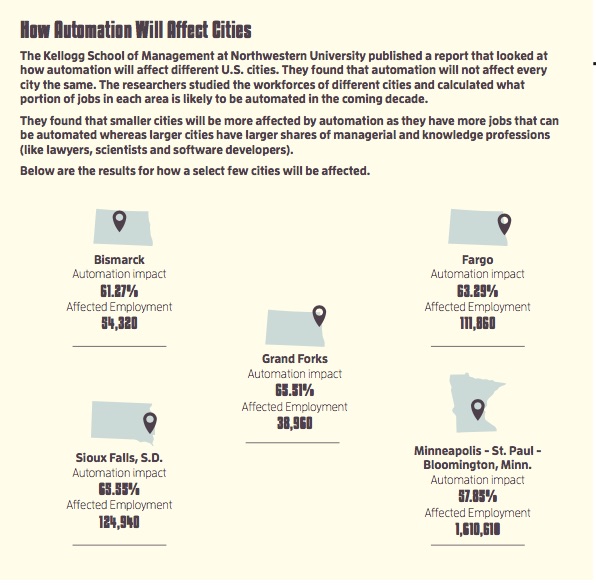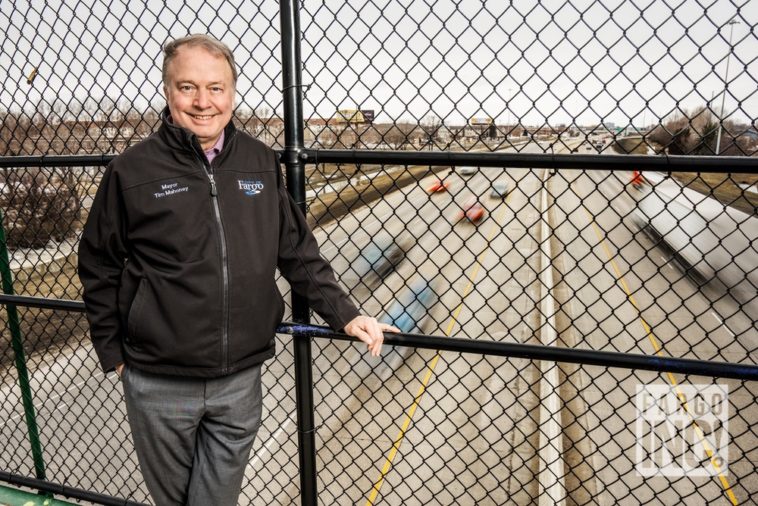Cities across the country are preparing for the inevitable shift that will come from automation. From the way traffic is run to improved effciencies with garbage disposal, it will affect day-to-day life on a dramatic scale. We talked with Fargo Mayor Tim Mahoney on what they are doing to prepare for the arrival of automation.
Q: What discussions are happening in terms of city planning when it comes to automation and where things are going?
A: Eventually, we think there could be autonomous vehicles within the community so we’re doing everything we can to continue to sync up our signals and how our city works. I always tease the traffic guys if they can make the lights automatic so when I come to work in the morning, it goes off each time.
That’s where we’re going. How many people are coming to work in one direction? Can we do it with the ebb and flow of how that works? What that does is having actual monitors in every intersection throughout the community so you know what’s going on so if there’s a traffic jam, you can direct traffic. If there’s something else going on in the community, you can help.
We’re looking at different ways that automation will really help us make the urban experience better for people and not have follow-ups that happen if you don’t know what’s going on in that area. Now, sometimes, if there’s a problem in part of the city, we have to send someone out to look at it. Our pumps in the flood fight right now are all running but we still have someone to drive around to check them all the time. It would be great to have something that’s all automatic.
Q: How far do you think we are away from that kind of future?
A: The governor thinks it’s 10 years. We think it’s going to be a little bit longer than that. We still think most farmers and urban people like to drive a car. We still think we’re a little bit behind to how people will adapt to that. A lot of millennials in town, however, are a little bit different. They take a bike, walk or take an Uber so we’re starting to transition to that younger group who says, ‘Hey, I don’t need my own car.’
Q: When people think of automation, most people think of jobs being replaced. How should we be looking at and embracing this technology?
A: We had a company come to us that’s going to expand their plant. They make T-shirts, logos and those types of things. Yes, they’re going to more automation but they’re then going to go to a higher wage for the employees so the employees are going to have to know how to run the computerized models that come out. I think what will happen is that we’ll have fewer people doing certain jobs but we will see, in the future, better-paying jobs, jobs that will probably be a little more exciting for the people and will combine their mental skills along with their manual skills. We’ll have a step up for people.

Q: According to a Northwestern report (see sidebar), smaller cities will be more affected by automation than larger cities. Should this scare Fargo?
A: We know this is going to happen so in our garbage disposal area, we just have two men on a truck and a lot of backend users as well because there’s a lot of manual labor there. Now we’ve converted over to an automatic garbage truck that picks up the garbage can and puts it in the truck. We have a lot fewer injuries but we have a lot more efficiency. We see some of the automation as it can help us become more efficient in the city and also bring up different jobs that people would have in managing – managing people, managing decision making and managing growth about where we’re going to go in the future.
We see it as a Catch 22 so in some ways, it’ll be helpful and hopefully have more jobs that are exciting within the community. But, in the same way, there will be some efficiency that will decrease the cost for everybody.
Q: One of the cities and the state’s biggest problems is workforce. Automation can help solve our workforce shortage. What are your thoughts on that?
A: When I talk to other mayors across the country, they all have trouble with workforce. A lot of our kids want to go to college but do they need to go to college? Could we train them in a different way for a different job that they would find just as much satisfaction in and have a good wage? We think the challenge and the future for all the cities are how to attract the workforce to come to the community.
Right now, Fargo is attracting young people. Millennials like the feel and atmosphere of the community and we want to continue that. To me, that’s having young bright people trying to figure out better ways of doing things. We feel, in a lot of ways that would attract a group of people that will be a lot of fun to have in the community to help us continue to grow.




